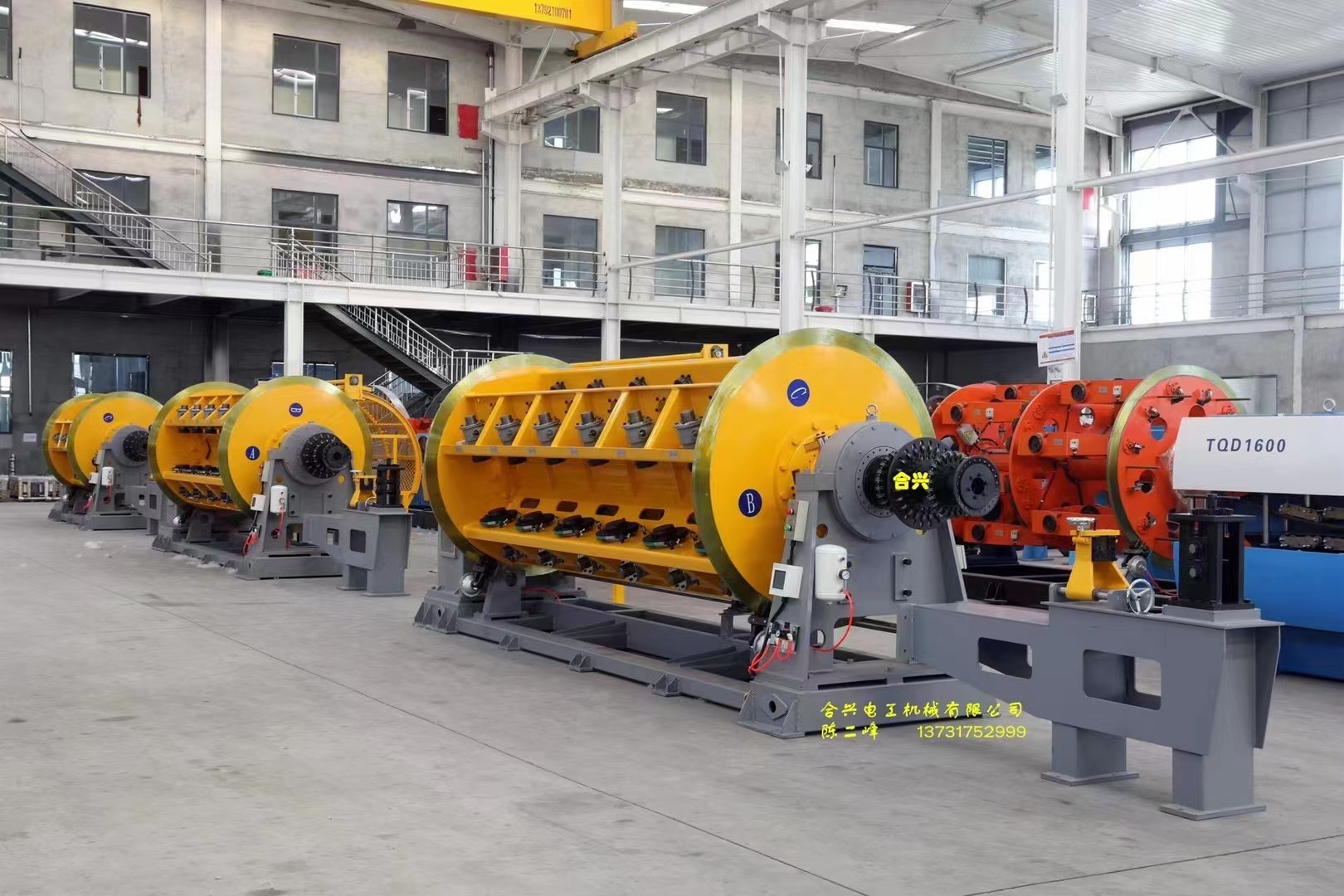How Cable Wire Manufacturing Machines are Revolutionizing the Electrical Industry
Release time:
2025-06-12
How Cable Wire Manufacturing Machines are Revolutionizing the Electrical Industry Table of Contents 1. Understanding Cable Wire Manufacturing Machines 2. The Importance of Cable Wire in Electrical Systems 3. Key Technologies in Cable Wire Manufacturing 3.1 Automation and Robotics 3.2 Advanced Materials and Coatings 4. Efficiency Gains in Manufacturing Processes 4.1 Reduced Production Time 4.2 Enha

How Cable Wire Manufacturing Machines are Revolutionizing the Electrical Industry
Table of Contents
1. Understanding Cable Wire Manufacturing Machines
2. The Importance of Cable Wire in Electrical Systems
3. Key Technologies in Cable Wire Manufacturing
3.1 Automation and Robotics
3.2 Advanced Materials and Coatings
4. Efficiency Gains in Manufacturing Processes
4.1 Reduced Production Time
4.2 Enhanced Quality Control
5. Sustainability in Cable Wire Manufacturing
5.1 Eco-Friendly Materials
5.2 Energy Efficiency
6. Future Trends in Cable Wire Manufacturing Technology
6.1 Smart Manufacturing and Industry 4.0
6.2 Customization and Flexibility
7. Challenges Facing the Cable Wire Manufacturing Industry
8. Conclusion
9. FAQs
1. Understanding Cable Wire Manufacturing Machines
Cable wire manufacturing machines are specialized equipment used in the production of electrical cables and wires. These machines facilitate various processes such as wire drawing, insulation, and cabling. The evolution of these machines has played a pivotal role in enhancing productivity and quality in the electrical industry. By embracing innovative technologies, manufacturers can produce higher-quality products while optimizing their operations.
2. The Importance of Cable Wire in Electrical Systems
Cable wire is integral to electrical systems, serving as the primary medium for carrying electrical current. These wires are essential in a myriad of applications, from residential wiring to complex industrial setups. The demand for reliable and efficient cabling solutions has led to advancements in manufacturing technologies, ensuring that the electrical industry keeps pace with the increasing needs for power distribution and communication systems.
3. Key Technologies in Cable Wire Manufacturing
The cable wire manufacturing process has undergone significant technological advancements, contributing to enhanced performance and efficiency. Key technologies include:
3.1 Automation and Robotics
Automation has revolutionized the cable wire manufacturing sector. With the integration of robotics, manufacturers can achieve higher precision and reduced labor costs. Automated systems can consistently produce cables that meet stringent quality standards while minimizing human error.
3.2 Advanced Materials and Coatings
The development of advanced materials and coatings has improved the durability and performance of cable wires. Innovations such as thermoplastic elastomers and enhanced insulation materials ensure that cables can withstand extreme environmental conditions while maintaining their electrical integrity.
4. Efficiency Gains in Manufacturing Processes
The adoption of modern cable wire manufacturing machines has led to substantial efficiency gains in production.
4.1 Reduced Production Time
Modern machines enable manufacturers to streamline their operations, resulting in significantly reduced production times. Enhanced speed and efficiency mean that manufacturers can meet growing market demands without compromising quality.
4.2 Enhanced Quality Control
Quality control processes have been improved through real-time monitoring and data analysis. Advanced machines are equipped with sensors and software that detect defects early in the production process, ensuring that only high-quality products reach the market.
5. Sustainability in Cable Wire Manufacturing
Sustainability is becoming increasingly important in manufacturing industries, and cable wire production is no exception.
5.1 Eco-Friendly Materials
The electrical industry is moving towards using eco-friendly materials in cable production. Biodegradable and recyclable materials reduce the environmental impact and appeal to environmentally conscious consumers.
5.2 Energy Efficiency
Energy-efficient manufacturing processes are being implemented to minimize energy consumption. By investing in modern machinery that consumes less power, manufacturers not only reduce costs but also contribute to a more sustainable future.
6. Future Trends in Cable Wire Manufacturing Technology
Looking ahead, the cable wire manufacturing sector is poised for continued innovation.
6.1 Smart Manufacturing and Industry 4.0
The rise of smart manufacturing represents a significant trend, where Internet of Things (IoT) technology connects machinery, enabling better data management and operational efficiency. This interconnectedness will allow manufacturers to respond quickly to market demands.
6.2 Customization and Flexibility
As customer needs evolve, manufacturers are required to offer more customized solutions. Modern cable wire manufacturing machines can adapt to produce various types of cables, reducing downtime and increasing flexibility.
7. Challenges Facing the Cable Wire Manufacturing Industry
Despite the advancements, challenges remain prevalent in the cable wire manufacturing industry. Issues such as fluctuating raw material costs, regulatory compliance, and maintaining skilled labor can hinder progress. Manufacturers must navigate these challenges while continuing to innovate to stay competitive.
8. Conclusion
In summary, cable wire manufacturing machines are pivotal in transforming the electrical industry. By leveraging advanced technologies, manufacturers can enhance efficiency, improve product quality, and embrace sustainability. As the industry evolves, staying informed about emerging trends and challenges will be crucial for continued success.
9. FAQs
1. What are the main functions of cable wire manufacturing machines?
Cable wire manufacturing machines perform various functions, including wire drawing, insulation application, and cabling, ensuring the production of high-quality electrical cables.
2. How do automation and robotics enhance cable wire manufacturing?
Automation and robotics improve precision, reduce labor costs, and increase production speed, leading to more efficient manufacturing processes.
3. What materials are used in cable wire manufacturing?
Common materials include copper and aluminum for conductors, along with various insulation materials such as PVC and thermoplastic elastomers.
4. How does sustainability impact cable wire manufacturing?
Sustainability promotes the use of eco-friendly materials and energy-efficient processes, reducing the environmental impact of manufacturing operations.
5. What future trends should manufacturers be aware of in cable wire production?
Key trends include smart manufacturing, customization capabilities, and the integration of advanced materials that enhance product performance and sustainability.
This comprehensive exploration of how cable wire manufacturing machines are revolutionizing the electrical industry highlights their critical role in driving innovation and efficiency.
TAG:
Recommend News
HEXING CABLE MACHINERY
TEL: +86-317-3601666, +86-317-3236119
FAX: +86-317-3618408
E-MAIL: china@hbhxdg.cn
E-MAIL: hbhxdg@gmail.com
WEB: http://www.hbhxdg.cn
ADD: Baoantun Industrial Zone, Hejian City, Hebei Province

